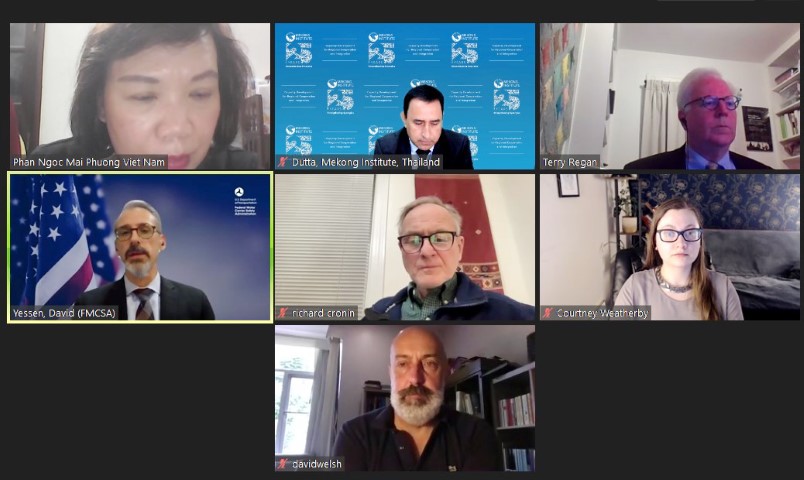To explore solutions to key policy and sustainability challenges facing the Lower Mekong, the United States Department of State, together with the Stimson Center and the International Union for the Conservation of Nature, organized a series of Partnership Policy Dialogues that will run from 2021 to 2023.
Mr. Madhurjya K. Dutta, Director of Trade and Investment Facilitation Department of the Mekong Institute, joined one of the panel sessions of the Track 1.5 Policy Dialogue on Connectivity, which was held as a closed-door virtual event with more than 100 government and non-government participants on March 15 to 22, 2022. This event, which is the third of the policy dialogue series, focused on connectivity challenges in the Mekong region. Panelists explored policy challenges and best practices from the US, Mekong countries, and development partner countries on needs related to economic, human, digital, and environmental connectivity. Cross-cutting values of inclusivity, resilience (including climate), and collaboration were also presented and discussed during the sessions.
With the topic ‘Economic Connectivity: Transportation, commerce, and regional economic connectivity,’ Mr. Dutta shared in his panel discussion the salient features of the Greater Mekong Subregion (GMS), its connectivity-related infrastructure and policy frameworks, specifically the Cross-Border Transport Agreement (CBTA). He also elaborated on the various GMS economic corridor and emphasized the development initiatives to foster stronger connectivity in the region.
With the COVID-19 pandemic as the centerpiece of the discussion, Mr. Dutta highlighted the cross-border transportation measures in the region during the pandemic, such as: increase in digitalization and paperwork for cross-border trade facilitation; oversight of cross-border management; implementation of quarantine measures to control the spread of the virus; compliance of freight transport sites with preventative measures; and cross-sectoral and multi-ministerial support and collaboration.
To address the challenges and opportunities brought by the pandemic, such as decline in sales, reduction of employees, lack of capital, and changing consumer behaviors, Mr. Dutta shared some recommendations for recovery and seamless connectivity, such as:
- Keep borders open for freight for continuity of cross-border freight operations
- Cooperation and coordination to ensure efficiency and resiliency of supply chain networks.
- Information exchange, including sharing real time information on cross-border freight restrictions and cross-border movements
- Harmonized practices in the transport response to pandemic situation
- Digitalization of cross-border transport services, e.g., electronic certification and remote monitoring of transport operations
- Common Capacity building program on transport and logistics digitalization
- Simplify procedures at cross-border checkpoints
In an open forum, Mr. Dutta, together with Mr. David Yessen of the US Federal Motor Carrier Safety Administration and Madame Phuong Phan of the Vietnam Institute of Development Strategies, discussed further on the challenges related to cross-border transport and security, including cross-border COVID guidelines and requirements. The panelists emphasized the importance of policy dialogues and human resource development activities to harmonize related policies and programs among the Mekong countries.
The panel discussion was moderated by Mr. Terry Regan of the US Department of Transportation Volpe Center.








